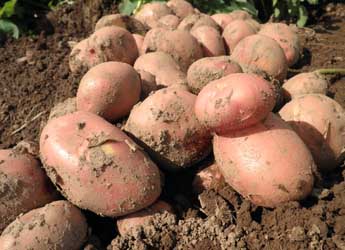United Kingdom
May 30, 2012
Edinburgh becomes the focus for the world’s third most important food crop next week.
The World Potato Congress comes to the Edinburgh International Conference Centre from Sunday 27 May. It takes place every three years, and the 2012 event will feature experts from the USA, China, New Zealand, South Africa, Australia, Canada, the Netherlands and the UK.

Scotland is a world-leader in potato technology and the Aberdeen and Dundee-based James Hutton Institute is one of the Congress’s Gold Sponsors. The Institute’s Dr Glenn Bryan led the UK component of last year’s international project which successfully mapped the potato genome. He will address the delegates on Tuesday, the second full day of the Congress, and speak about the prospects for improving production, enhancing nutritional properties and meeting consumer needs.
Dr Bryan believes genetics-based selection holds huge promise, but adds there is still much work to be done to turn science into reality.
“The sequencing of the genome will really help us put more science into the sector,” he said. “But, while we now know where each of the 40,000 genes in a potato chromosome is, we don’t know what they all do.”
Identifying what traits they confer can take a year or more for each gene. Fortunately, there are shortcuts. For example, similar DNA sequences may occur in other organisms, giving a good steer on what they do. And, rather than pinpointing the exact gene, genetic markers can be used. These specific DNA sequences are associated with a particular gene or trait, but are much easier to identify and develop.
Within a few years growers and consumers could start to reap significant benefits from the sequencing of the genome, says Glenn. “We won’t see an immediate effect, but within five to 10 years we will start to see a real impact.”
On the final day of the Congress, the delegates are being given the opportunity of visiting the James Hutton Institute and seeing part of the Commonwealth Potato Collection, a plant and seed bank of global importance that is cared for by the James Hutton Institute with the support of the Scottish Government.
Globally, more than 320 million tons of potatoes are produced annually, making potato the third most important food crop in world. Since 2005, more than half of all potatoes produced in the world have been grown in developing countries, and that percentage is steadily increasing.